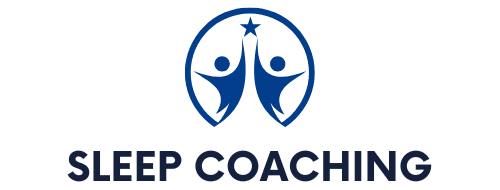Sleep coaching has become a hot topic, but along with its rise in popularity comes a wave of misconceptions. How can you separate fact from fiction? For many parents, navigating the myths surrounding sleep coaching can feel overwhelming, making it harder to find reliable guidance.
This article breaks down the most common myths, clears up confusion, and provides the facts you need to make informed decisions. Whether you’re a first-time parent or a seasoned pro, understanding sleep coaching can pave the way to more restful nights for you and your little ones. Let’s uncover the truth together!

Table of Contents
What Is Sleep Coaching? A Guide for Parents
Sleep coaching can be a transformative solution for families navigating sleep challenges. But what exactly does it involve? Let’s break it down to understand its value.
What Is Sleep Coaching?
Sleep coaching is a personalized and structured approach designed to help families improve sleep habits and create healthier sleep routines. It’s about teaching both parents and children how to achieve more restful nights through effective strategies and support. Here are the key elements:
- Personalized Plans: No two families are alike. Sleep coaches tailor their guidance to each family’s unique needs, considering factors like age, sleep patterns, and daily routines.
- Gentle Techniques: Instead of using harsh methods, sleep coaching emphasizes gentle, child-friendly strategies that foster comfort and security.
- Education: Knowledge is empowering! Coaches provide insights into sleep cycles, schedules, and healthy sleep habits, equipping parents with the tools they need for success.
- Ongoing Support: Sleep coaches act as partners in the process, offering encouragement, troubleshooting challenges, and helping families stay on track.
How Sleep Coaches Help Families
Sleep coaching goes beyond quick fixes, focusing on sustainable changes to make bedtime smoother for everyone. Here’s how sleep coaches provide support:
- Sleep Schedules: Coaches help establish consistent routines, creating predictability that makes it easier for children to fall asleep.
- Sleep Environment: They guide families in creating an ideal sleep space, offering tips on lighting, noise control, and room temperature for optimal rest.
- Behavioral Strategies: Techniques like gradual withdrawal teach parents how to gently transition away from being present as their child falls asleep, fostering independence.
- Monitoring Progress: Tracking sleep patterns over time helps identify what’s working and allows for adjustments to maximize results.
Sleep coaching isn’t just about bedtime routines—it’s a thoughtful, supportive approach to improving sleep for the whole family. With expert guidance, peaceful nights become attainable, making mornings brighter and more energized for everyone.
Debunking Myths About Sleep Coaching
Sleep coaching is surrounded by numerous misconceptions, which can leave parents hesitant to explore this valuable resource. Let’s clear up the confusion by addressing some widely held myths and uncovering the truth about sleep coaching.
Myth: Sleep Training Is Just Cry-It-Out
A common belief is that sleep training revolves solely around the cry-it-out (CIO) method. The truth is that sleep training includes a range of strategies, many of which are gentle and prioritize comfort and security. Techniques like gradual withdrawal or responsive soothing help children learn to self-soothe at their own pace, minimizing distress. Sleep coaching focuses on creating a personalized plan that aligns with a child’s temperament and a family’s unique dynamics.
Myth: Sleep Coaches Can’t Help Older Kids
Another misconception is that sleep coaching is only for infants. In reality, sleep coaches work with children of all ages. Whether it’s a toddler resisting bedtime, a school-aged child dealing with nightmares, or a teenager struggling with irregular sleep schedules, a sleep coach can provide tailored solutions. Sleep challenges don’t disappear after infancy, and professional guidance can benefit children at every stage.
Myth: Sleep Coaching Is Only for Newborns
While many new parents turn to sleep coaching for their newborns, it’s a myth that these services are limited to infants. Sleep coaching is effective for toddlers, school-aged children, and even older kids. As children grow and their sleep needs evolve, sleep coaching adapts to address challenges like bedtime procrastination or sleep transitions.
Myth: All Sleep Coaches Are the Same
Not all sleep coaches take the same approach. Coaching styles, methods, and philosophies vary widely. Some coaches focus on gentle, attachment-based strategies, while others may use structured or behavioral approaches. Choosing the right coach involves understanding their methods and ensuring their approach aligns with your family’s values and needs. Researching options and asking questions can help you find the perfect fit.
Myth: Sleep Coaching Means Parent Guilt
Seeking help for sleep challenges can sometimes bring feelings of guilt or stigma. However, reaching out to a sleep coach is a proactive and empowering step toward healthier sleep for the entire family. Recognizing that everyone needs support at times can help parents let go of guilt and focus on creating better sleep habits. Remember, well-rested parents and children are happier and healthier—and there’s no shame in asking for help.
The Benefits of Sleep Coaching for Families
Sleep coaching offers more than just a way to get kids to sleep—it creates a healthier, more restful experience for the entire family. By establishing better sleep habits, parents and children alike can enjoy less stress, more energy, and improved well-being. Let’s explore some of the key benefits.
Improved Sleep for Kids and Parents
Investing in sleep coaching doesn’t just help your child—it benefits the whole household. Imagine waking up refreshed instead of exhausted! Here’s how sleep coaching transforms family sleep dynamics:
- Longer, Deeper Sleep: With the right guidance, children fall asleep faster and stay asleep longer, reducing nighttime wake-ups for everyone.
- Less Stress at Bedtime: A structured approach eliminates uncertainty, giving parents confidence in their bedtime routines and reducing frustration.
- Happier Mornings: Well-rested children and parents are more patient, cheerful, and better equipped to handle the day ahead.
- More Quality Family Time: With smoother evenings and less bedtime resistance, families can enjoy relaxed, meaningful moments together.
When everyone sleeps better, the entire household benefits, creating a more peaceful and balanced home environment.
Customized Approaches for Individual Needs
Every child and family has unique sleep challenges, which is why a personalized approach makes sleep coaching so effective. Coaches design plans that align with each family’s needs rather than offering a one-size-fits-all solution. Here’s what makes customized coaching so valuable:
- Understanding Family Dynamics: A good sleep coach considers each family’s lifestyle, parenting style, and sleep challenges to create a realistic and achievable plan.
- Age-Appropriate Techniques: Different ages require different strategies. Coaches provide tailored guidancefor infants, toddlers, and older children, adapting to each developmental stage.
- Flexible Strategies: Whether a family prefers a gentle, gradual approach or a more structured method, coaches adjust their recommendations to ensure comfort and effectiveness.
- Ongoing Support & Adjustments: Coaching isn’t a one-time solution—it’s a guided process. Sleep coaches help troubleshoot challenges along the way, ensuring long-term success.
By choosing sleep coaching, parents gain expert guidance and a customized plan to foster healthier sleep habits. When bedtime becomes predictable and peaceful, everyone wins!
How to Find the Right Sleep Coach
Finding the right sleep coach can feel overwhelming with so many options available. The key is to choose someone who aligns with your family’s needs and values. Here are some essential tips to help you make the best choice.
Check Credentials and Experience
Before committing to a sleep coach, take a close look at their background. Proper training and experience ensure they can provide effective guidance. Here’s what to consider:
- Training and Certification: A reputable sleep coach should have formal training from recognized organizations. Certifications indicate that they’ve studied proven sleep coaching methods and understand best practices.
- Relevant Experience: Experience matters! Ask how long they’ve been coaching and whether they’ve worked with children of different ages and sleep challenges. A seasoned coach will have a track record of success.
- Specializations: Some sleep coaches focus on newborns, while others work with toddlers or older children. Choosing a coach who specializes in your child’s age group ensures tailored advice and effective strategies.
A well-qualified coach sets the stage for long-term sleep success—just like choosing the right doctor makes all the difference in healthcare.
Read Reviews and Testimonials
Nothing speaks louder than first-hand experiences from other parents. Reviews and testimonials offer valuable insights into a sleep coach’s effectiveness and approach. Here’s how to evaluate them:
- Client Feedback: Browse testimonials on the coach’s website, social media, or parenting forums. Look for mentions of effectiveness, communication, and overall satisfaction.
- Online Reviews: Check platforms like Google Reviews or parenting groups for feedback. Consistent positive reviews suggest reliability, while repeated concerns may be a red flag.
- Ask for References: If you want more reassurance, request direct references from past clients. Speaking with parents who’ve worked with the coach can give you a clear picture of their approach and results.
Getting input from other families can make choosing a sleep coach easier—just like getting recommendations for a trusted pediatrician or the best pizza spot in town!
Final Thoughts: Is Sleep Coaching Right for Your Family?
As we wrap up, it’s clear that understanding the truth about sleep coaching can pave the way for better sleep for your entire family. Sleep coaching isn’t about rigid methods or quick fixes—it’s about personalized, supportive strategies that help children (and parents) achieve healthier, more restful sleep.
Here are some key takeaways:
- Sleep coaching isn’t just about crying it out—it includes gentle, adaptable methods tailored to your child’s needs.
- Coaches work with children of all ages, not just infants. Sleep challenges can arise at any stage, and expert guidance can help.
- Personalized plans make all the difference. Every family is unique, and the right approach is one that fits your household.
- Seeking help is a proactive step, not something to feel guilty about. Prioritizing sleep benefits the entire family.
If you’re considering sleep coaching, take the time to research potential coaches, review their credentials, and read client feedback. Asking the right questions will help you find the best fit for your family’s needs.
Are you ready for more restful nights and brighter mornings? Sleep coaching can be a transformative resource, helping your family build healthier sleep habits—and you all deserve that.
Clearing Up Confusion: Sleep Coaching Myths FAQ
What is sleep coaching?
Sleep coaching is a structured approach that helps families improve sleep habits through personalized strategies. It focuses on teaching children and parents how to establish healthy sleep routines, reduce sleep struggles, and promote better rest using proven techniques tailored to individual needs.
Does sleep coaching always involve the cry-it-out (CIO) method?
No! Sleep coaching includes a variety of techniques, many of which are gentle and responsive. While CIO is one approach, most sleep coaches use gradual methods that prioritize comfort, reassurance, and a child’s temperament to support healthier sleep habits.
Can sleep coaching help children of all ages?
Yes! Sleep coaching isn’t just for newborns. It can benefit toddlers, school-aged children, and even teenagers who struggle with sleep schedules, bedtime resistance, or nighttime awakenings.
How do sleep coaches create personalized sleep plans?
Sleep coaches assess a child’s sleep patterns, temperament, family routines, and parental preferences. They then develop a customized sleep plan that aligns with the family’s lifestyle and goals, adjusting strategies as needed for the best results.
Are all sleep coaches the same?
No. Coaching styles, qualifications, and methods vary. Some coaches specialize in infants, while others work with older children. Some use more structured approaches, while others focus on gentle, attachment-based methods. It’s important to find a coach whose approach aligns with your parenting philosophy.
What are the benefits of sleep coaching?
Sleep coaching helps families:
• Establish consistent bedtime routines for better sleep.
• Reduce bedtime struggles and night wakings.
• Improve sleep quality for both children and parents.
• Create a calmer, more predictable nighttime environment.
• Develop lifelong healthy sleep habits.
How do I choose the right sleep coach?
When selecting a sleep coach, consider the following:
• Training and certification from a reputable sleep coaching organization to ensure they use proven methods.
• Experience with children in your child’s age group since different ages require different approaches.
• Reviews and testimonials from other parents to gauge their effectiveness and reliability.
• A coaching approach that aligns with your parenting values, whether you prefer gentle methods or a structured strategy.
• A willingness to answer questions or provide references so you can feel confident in your decision.
• Taking the time to find the right fit will make the coaching process more effective and comfortable for your family.
How long does sleep coaching take to see results?
Results vary depending on the child and family consistency, but many parents see improvements within 1-2 weeks. More complex sleep challenges may take several weeks of gradual adjustments to fully resolve.
Is sleep coaching only for parents struggling with severe sleep problems?
No. Even minor sleep struggles can benefit from professional guidance. Whether you need help with nap transitions, bedtime resistance, or optimizing sleep schedules, a coach can make bedtime easier and more predictable.
Will sleep coaching make my child completely independent at bedtime?
The goal of sleep coaching is to build healthy, age-appropriate sleep habits. Some children naturally become more independent, while others still need some parental reassurance at bedtime. A good coach will tailor the approach to what works best for your family.
What if I feel guilty about using a sleep coach?
Seeking help isn’t a sign of failure—it’s a proactive step toward better sleep for your family. Sleep coaching isn’t about forcing change; it’s about finding a solution that supports restful nights for everyone.
Is sleep coaching worth the investment?
Many parents find that improving sleep quality has a significant positive impact on their entire family’s well-being. Better sleep leads to happier mornings, reduced stress, and healthier development for children. If bedtime struggles are affecting your quality of life, sleep coaching can be a valuable, long-term solution.
Stone Evans, Founder of SleepCoaching.com
Stone Evans is the founder of SleepCoaching.com which has become one of the most popular destinations online for people seeking better sleep. Stone started developing this website after realizing his own sleep struggles and then beginning an intensive period of study (which included professional sleep coach training) and ongoing lifestyle changes to improve and optimize his sleep.
Now through in-depth articles from sleep experts around the world, the internet's leading and most comprehensive sleep coaching directory, quantitative sleep product reviews and Stone's personal daily sleep tracking journey, visitors to our website regularly report gaining information and insights that are helping them achieve better health, better sleep and a better quality of life.

